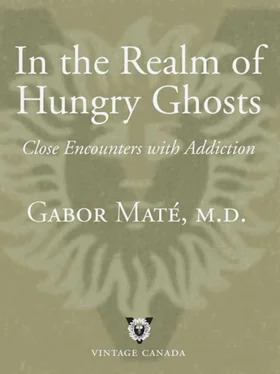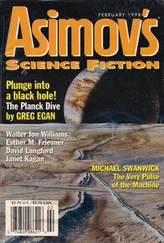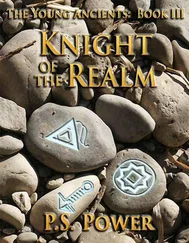What draws me here? All of us who are called to this work are responding to an inner pull that resonates with the same frequencies that vibrate in the lives of the haunted, drained, dysfunctional human beings in our care. But of course, we return daily to our homes, outside interests and relationships while our addict clients are trapped in their downtown gulag.
Some people are attracted to painful places because they hope to resolve their own pain there. Others offer themselves because their compassionate hearts know that here is where love is most needed. Yet others come out of professional interest: this work is ever challenging. Those with low self-esteem may be attracted because it feeds their egos to work with such powerless individuals. Some are lured by the magnetic force of addictions because they haven’t resolved, or even recognized, their own addictive tendencies. My guess is that most of us physicians, nurses and other professional helpers who work in the Downtown Eastside are impelled by some mixture of these motives.
Liz Evans began working in the area at the age of twenty-six. “I was overwhelmed,” she recalls. “As a nurse, I thought I had some expertise to share. While that was true, I soon discovered that, in fact, I had very little to give—I could not rescue people from their pain and sadness. All I could offer was to walk beside them as a fellow human being, a kindred spirit.
“A woman I’ll call Julie was locked in her room and force-fed a liquid diet and beaten by her foster family from age seven on—she has a scar across her neck from where she slashed herself when she was only sixteen. She’s used a cocktail of painkillers, alcohol, cocaine and heroin ever since and works the streets. One night she came home after she’d been raped and crawled into my lap, sobbing. She told me repeatedly that it was her fault, that she was a bad person and deserved nothing. She could barely breathe. I longed to give her anything that would ease her pain as I sat and rocked her. It was too intense for me to bear.” As Liz discovered, something in Julie’s pain triggered her own. “This experience showed me that we have to keep our own issues from turning into barriers.”
“What keeps me here?” muses Kerstin Stuerzbecher. “In the beginning I wanted to help. And now…I still want to help, but it’s changed. Now I know my limits. I know what I can and cannot do. What I can do is to be here and advocate for people at various stages in their lives, and to allow them to be who they are. We have an obligation as a society to…support people for who they are, and to give them respect. That’s what keeps me here.”
There’s another factor in the equation. Many people who’ve worked in the Downtown Eastside have noticed it: a sense of authenticity, a loss of the usual social games, the surrender of pretence—the reality of people who cannot declare themselves to be anything other than what they are.
Yes, they lie, cheat and manipulate—but don’t we all, in our own way? Unlike the rest of us, they can’t pretend not to be cheaters and manipulators. They’re straight-up about their refusal to take responsibility, their rejection of social expectation, their acceptance of having lost everything for the sake of their addiction. That isn’t much by the straight world’s standards, but there’s a paradoxical core of honesty wrapped in the compulsive deceit any addiction imposes. “What do you expect, Doc? After all, I’m an addict,” a small, skinny forty-seven-year-old man once said to me with a wry and disarming smile, having failed to wheedle a morphine prescription. Perhaps there’s a fascination in that element of outrageous, unapologetic pseudo-authenticity. In our secret fantasies who among us wouldn’t like to be as carelessly brazen about our flaws?
“Down here you have honest interactions with people,” says Kim Markel, the nurse at the Portland Clinic. “I can come here and actually be who I am. I find that rewarding. Working in the hospitals or in different community settings, there’s always pressure to toe the line. Because our work here is so diverse and because we’re among people whose needs are so raw and who have nothing left to hide, it helps me maintain honesty in what I do. There’s not that big shift between who I am at work and who I am outside of work.”
Amidst the unrest of irritable drug seekers hustling and scamming for their next high, there also occur frequent moments of humanity and mutual support. “There are amazing displays of warmth all the time,” Kim says. “Although there’s a lot of violence, I see many people caring for each other,” adds Bethany Jeal, a nurse at Insite, North America’s first supervised injection site, located on Hastings, two blocks from the Portland. “They share food, clothing and makeup—anything they have.” People tend to each other through illness, report with concern and compassion on a friend’s condition and often display more kindness to someone else than they usually give themselves.
“Where I live,” Kerstin says, “I don’t know the person two houses down from me. I vaguely know what they look like, but I certainly don’t know their name. Not down here. Here people know each other, and that has its pros and its cons. It means that people rail at each other and rage at each other, and it also means that people will share their last five pennies with each other.
“People here are very raw, so what comes out is the violence and ugliness that often gets highlighted in the media. But that rawness also brings out raw feelings of joy and tears of joy—looking at a flower I hadn’t noticed but someone living in a one-room at the Washington Hotel has noticed because he’s down here every day. This is his world and he pays attention to different details than I do….”
Nor is humour absent. As I walk my Hastings rounds from one hotel to another, I witness much back-slapping banter and raucous laughter. “Doctor, doctor, gimme the news,” comes a jazzy sing-song from under the archway of the Washington. “Hey, you need a shot of rhythm an’ blues,” I chant back over my shoulder. No need to look around. My partner in this well-rehearsed musical routine is Wayne, a sunburned man with long, dirty blond curls and Schwarzenegger arms tattooed from wrist to biceps.
I wait to cross an intersection with Laura, a Native woman in her forties, whose daunting life history, drug dependence, alcoholism and HIV have not extinguished her impish wit. As the red hand on the pedestrian traffic light yields to the little walking figure, Laura chimes up, her tone a shade sardonic: “White man says go.” Our paths coincide for the next half-block, and all the while Laura chuckles loudly at her joke. So do I.
The witticisms are often fearlessly self-mocking. “Used to bench press two hundred pounds, Doc,” Tony, emaciated, shrivelled and dying of AIDS, cracked during one of his last office visits. “Now I can’t even bench press my own dick.”
When my addict patients look at me, they are seeking the real me. Like children, they are unimpressed with titles, achievements, worldly credentials. Their concerns are too immediate, too urgent. If they come to like me or to appreciate my work with them, they will spontaneously express pride in having a doctor who is occasionally interviewed on television and is an author. But only then. What they care about is my presence or absence as a human being. They gauge with unerring eye whether I am grounded enough on any given day to co-exist with them, to listen to them as persons with feelings, hopes and aspirations as valid as mine. They can tell instantly whether I’m genuinely committed to their well-being or just trying to get them out of my way. Chronically unable to offer such caring to themselves, they are all the more sensitive to its presence or absence in those charged with caring for them.
Читать дальше












